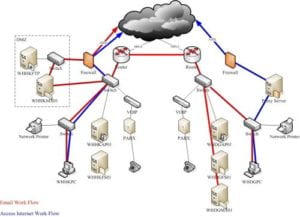There is no doubt that the Internet has become the most important infrastructure in our daily life. We depend on the Internet to work, entertain, maintain our social life, and learn.
It is believed that a windstorm in Britain who prevented stockbrokers from trade was partly to blame for the “Black Monday”, the downfall of the stock market globally. Without the Internet, the stock market was worried about open trades during the weekend which later led to panic selling. It shows how the Internet could improve the way we trade and help the market to maintain availability and flexibility to some degree. However, the topology of the Internet has also recreated the power structure of our society. With the Internet integrated into stock trading, program trading also prevails. Program trading helps the traders to process and adjust portfolio investments. With the increasing popularity of program trading based on the Internet and computing, it creates a new market for terminals that analyze and predict the stock market. In 2013, it already cost 2,000 dollars per month for one Bloomberg terminal. The Internet recreates the topology of information and contributes to the digital divide. The scarcity of such service prevents our society to deliver the idea of equality as a result of the aggregation effect when it comes to the chance to succeed.

Moreover, the infinity of the Internet re-teaches the idea of “learning”. The monopoly of knowledge is often regarded as the result of the monopoly of intellectual property. In the Fifteen Century, the limited lawful publication of the Bible guaranteed the monopoly of reading and interpretation of the will of God. As far as I am concerned, the monopoly of knowledge switches from the monopoly of access to intellectual property to access well-interpreted conclusions drawn from history since the human history and unlimited storage provided by the Internet make it impossible to rely on one’s thinking capability to understand the world. In other words, we transform the storage from our memory to the new cloud “brain”. Therefore, we consume conclusions rather than raw material that is supposed to support us to conclude on our own. It emphasizes and proves the new trend of the Bloomberg terminal as it processes trillions of trading information (imagine how long it takes for one person).
As a consequence, we need to understand the new concept of “survival” in the context of automation and the Internet, which notwithstanding are often regarded as the extension of the human brain. In Understanding Media: The Extensions of Man, by Marshall McLuhan, the last few chapters point out how we should start from the results and rethink through for every industry.
Leave a Reply